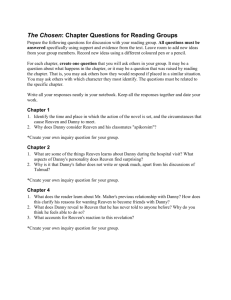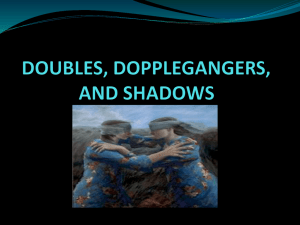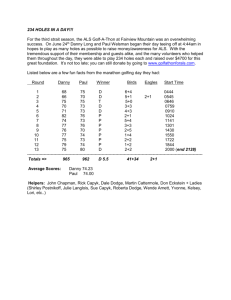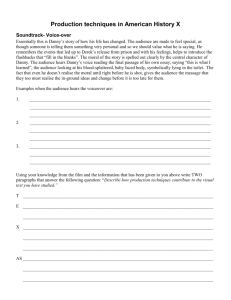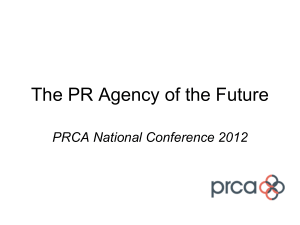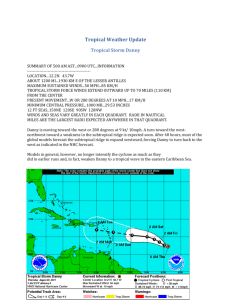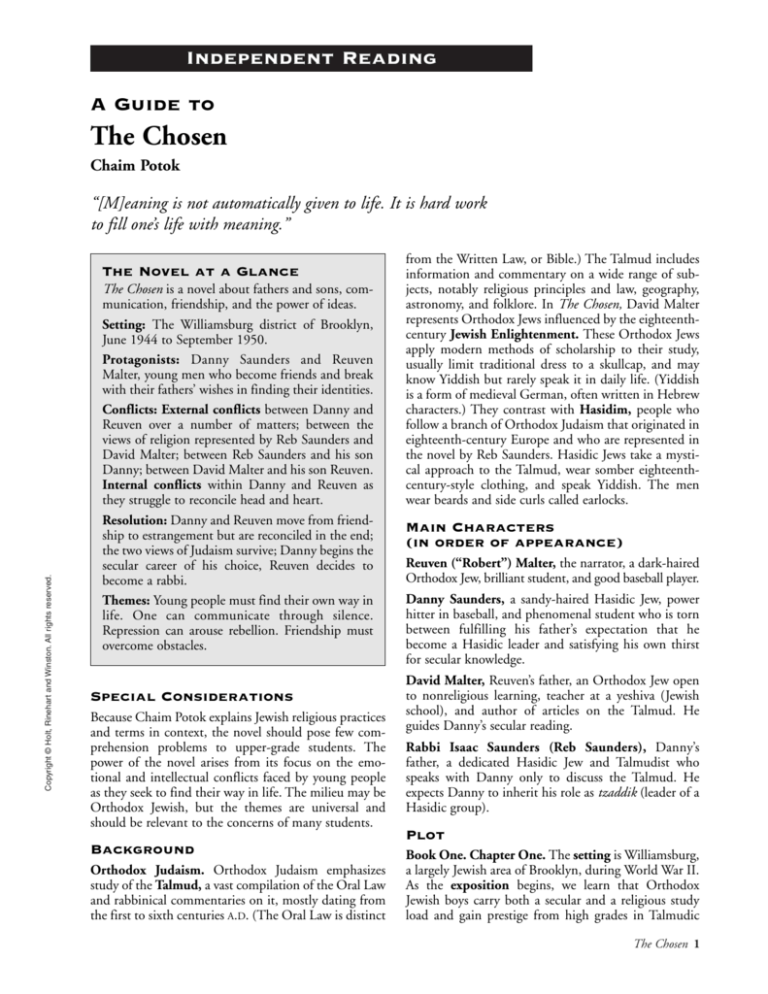
Independent Reading
A Guide to
The Chosen
Chaim Potok
“[M]eaning is not automatically given to life. It is hard work
to fill one’s life with meaning.”
Copyright © Holt, Rinehart and Winston. All rights reserved.
The Novel at a Glance
The Chosen is a novel about fathers and sons, communication, friendship, and the power of ideas.
Setting: The Williamsburg district of Brooklyn,
June 1944 to September 1950.
Protagonists: Danny Saunders and Reuven
Malter, young men who become friends and break
with their fathers’ wishes in finding their identities.
Conflicts: External conflicts between Danny and
Reuven over a number of matters; between the
views of religion represented by Reb Saunders and
David Malter; between Reb Saunders and his son
Danny; between David Malter and his son Reuven.
Internal conflicts within Danny and Reuven as
they struggle to reconcile head and heart.
Resolution: Danny and Reuven move from friendship to estrangement but are reconciled in the end;
the two views of Judaism survive; Danny begins the
secular career of his choice, Reuven decides to
become a rabbi.
Themes: Young people must find their own way in
life. One can communicate through silence.
Repression can arouse rebellion. Friendship must
overcome obstacles.
Special Considerations
Because Chaim Potok explains Jewish religious practices
and terms in context, the novel should pose few comprehension problems to upper-grade students. The
power of the novel arises from its focus on the emotional and intellectual conflicts faced by young people
as they seek to find their way in life. The milieu may be
Orthodox Jewish, but the themes are universal and
should be relevant to the concerns of many students.
from the Written Law, or Bible.) The Talmud includes
information and commentary on a wide range of subjects, notably religious principles and law, geography,
astronomy, and folklore. In The Chosen, David Malter
represents Orthodox Jews influenced by the eighteenthcentury Jewish Enlightenment. These Orthodox Jews
apply modern methods of scholarship to their study,
usually limit traditional dress to a skullcap, and may
know Yiddish but rarely speak it in daily life. (Yiddish
is a form of medieval German, often written in Hebrew
characters.) They contrast with Hasidim, people who
follow a branch of Orthodox Judaism that originated in
eighteenth-century Europe and who are represented in
the novel by Reb Saunders. Hasidic Jews take a mystical approach to the Talmud, wear somber eighteenthcentury-style clothing, and speak Yiddish. The men
wear beards and side curls called earlocks.
Main Characters
(in order of appearance)
Reuven (“Robert”) Malter, the narrator, a dark-haired
Orthodox Jew, brilliant student, and good baseball player.
Danny Saunders, a sandy-haired Hasidic Jew, power
hitter in baseball, and phenomenal student who is torn
between fulfilling his father’s expectation that he
become a Hasidic leader and satisfying his own thirst
for secular knowledge.
David Malter, Reuven’s father, an Orthodox Jew open
to nonreligious learning, teacher at a yeshiva (Jewish
school), and author of articles on the Talmud. He
guides Danny’s secular reading.
Rabbi Isaac Saunders (Reb Saunders), Danny’s
father, a dedicated Hasidic Jew and Talmudist who
speaks with Danny only to discuss the Talmud. He
expects Danny to inherit his role as tzaddik (leader of a
Hasidic group).
Plot
Background
Orthodox Judaism. Orthodox Judaism emphasizes
study of the Talmud, a vast compilation of the Oral Law
and rabbinical commentaries on it, mostly dating from
the first to sixth centuries A.D. (The Oral Law is distinct
Book One. Chapter One. The setting is Williamsburg,
a largely Jewish area of Brooklyn, during World War II.
As the exposition begins, we learn that Orthodox
Jewish boys carry both a secular and a religious study
load and gain prestige from high grades in Talmudic
The Chosen 1
Chapter Two. At Brooklyn Memorial Hospital,
Reuven awakens the next day in a sunlit ward with his
eye bandaged and meets his ward mates, Tony Savo, a
professional boxer, and Billy Merritt, a blind boy. David
Malter, his father, tells him that the eye surgeon successfully removed a piece of glass from the edge of his
pupil, but that scar tissue might develop. Malter is dismayed to hear that Reuven hates Danny. We recognize
him as a humane man and notice his cough. He leaves
Reuven a radio so his son can hear the war news.
(Reuven is not allowed to read.)
Chapter Three. Reuven awakens to excitement: It’s
D-Day, June 6, 1944, and the Allied invasion of Europe
has begun. Danny Saunders comes to apologize, but
Reuven rejects his advances out of hand. That evening
Reuven’s father reminds him that the Talmud teaches
forgiveness. When Danny returns the next day, the boys
discuss the rage they experienced on the ball field. Each
discovers the other is attracted to a career different from
his father’s expectations: Danny to psychology (not to
being a Hasidic leader), Reuven to the rabbinate (not to
a math professorship). Danny can memorize twice as
much of the Talmud per day as Reuven can because he
has a photographic mind.
Chapter Four. David Malter urges Reuven to befriend
Danny. On Thursday hospital personnel make urgent
visits to Tony Savo’s curtained-off bed, and Reuven and
Danny talk in the hall. Reuven learns that Danny hides
from his father the seven or eight works of secular philosophy and fiction he reads each week, because Reb
Saunders only approves of Talmudic study. Reuven,
who reads three or four books a week, tells Danny
about symbolic logic. Danny is struck dumb when
David Malter arrives; this is the man who has been
guiding his library reading. The next day, Friday, Tony
Savo seems better, even though his right eye had to be
removed. Billy has been taken to surgery. Reuven is
released with a positive prognosis.
Book Two. Chapter Five. Reuven relishes the wonderful smells of cooking prepared by Manya, the family
housekeeper. (His mother is no longer alive.) While
David works in his study, Reuven views every detail of
their flat with keen appreciation.
Chapter Six. After Shabbat (Sabbath) dinner, Reuven
asks his father about Danny. In exposition related to
2 The Chosen
the religious conflicts of the novel, David Malter
explains how Jews came to Poland in the thirteenth
century, how their status changed, how the mystic
known as the Ba’al Shem Tov (the Besht for short)
founded Hasidism in the eighteenth century, and how
the office of tzaddik developed. Malter says Danny will
most likely hate the tzaddik role he is supposed to
inherit from his father because he has a phenomenal
mind like the eighteenth-century genius Solomon
Maimon, who so thirsted for knowledge that he taught
himself German in order to read secular subjects. That
is why Danny reads “forbidden” books. Cut off from
his cultural roots, he is lonely and needs a friend.
Chapter Seven. This long chapter contains a complete
story. In the exposition, Reuven and his father attend
a Shabbat service at a synagogue that serves Orthodox
Jews influenced by the Jewish Enlightenment. That
afternoon, as Danny and Reuven talk, we learn that
Reuven’s mother died shortly after his birth, that Reb
Saunders lost his first family to terrorists in Russia and
led his whole community to America, and that his new
family includes Danny and two younger children. The
rising action begins when Danny leads Reuven around
a corner and into the Hasidic world of Reb Saunders’s
synagogue. Suspense builds throughout the events that
follow: the parting of a crowd for Danny; a service during which Danny’s pale little brother clings to Reb
Saunders’s robe; a meal; Reb Saunders’s delivery of a
Talmudic discourse; and a public test of Danny’s
knowledge. Astonished at the veneration the Hasidim
accord Reb Saunders and Danny, Reuven learns they
view their tzaddik as more than a rabbi—he is “a kind
of messenger of God, a bridge between his followers
and God.” The story reaches a crisis when Reb
Saunders turns to quiz Reuven, who realizes that his
friendship with Danny is at stake. Climactically,
Reuven answers correctly. The resolution seems to
assure the future of the friendship: the boys discover
they both plan to attend Hirsch College, an Orthodox
institution in Brooklyn.
Chapter Eight. After his first day back at school,
Reuven discusses Jewish history with Danny in the
public library. He is shaken to learn that Danny is
teaching himself German in order to read works of the
psychiatrist Sigmund Freud, and saddened to hear that
Danny’s little brother suffers from a blood disease
requiring lifelong medication. The next Shabbat,
Reuven engages in his first “Talmud battle” with Reb
Saunders and Danny. Although Danny knows more
than Reuven, David Malter’s teaching methods have
made Reuven equal to Danny in depth of understanding. In an incident intensifying the conflicts of the
novel, Reb Saunders privately grills Reuven on how
Danny came to discuss books with Reuven’s father.
Danny is relieved that he no longer needs to hide his
secular studies, but Reuven is distressed at having been
used as a buffer. He also can’t understand why Reb
Copyright © Holt, Rinehart and Winston. All rights reserved.
study. Sports events between yeshivas are designed to
demonstrate the boys’ Americanism. Fifteen-year-olds
Danny Saunders and Reuven Malter (the first-person
narrator of the novel) meet during a dramatic Sunday
baseball game that escalates into a kind of war, echoing
the outside world and establishing the basic conflicts of
the novel. Reuven injures his left wrist catching one of
Danny’s strong hits and is struck hard in the face by
another. His glasses shatter, and he sits out the rest of
the game because his eye is injured. The coach then
realizes Reuven needs to be taken to a hospital.
Saunders maintains total silence with Danny except for
discussing the Talmud.
Chapter Nine. Reuven’s eye is declared perfectly
healed, and he enjoys the reading and writing involved
in taking his final exams. Still exhilarated at the gift of
vision, he calls Billy Merritt’s house, only to learn that
Billy’s operation failed and he remains blind.
Chapter Ten. Reuven’s July is filled with ballgames, war
news, symbolic logic, and Talmud study with his father
and with Reb and Danny Saunders. Danny is frustrated
with Freud’s technical vocabulary until he realizes he
must study Freud as he studies the Talmud, with the
equivalent of a commentary at hand.
Copyright © Holt, Rinehart and Winston. All rights reserved.
Chapter Eleven. Reuven’s and Danny’s senior year at
separate yeshivas passes with little chance for them to
talk. First Reuven is too busy; then the various members of the Saunders and Malter households fall ill with
flu. Meanwhile the Allies press into German territory,
and America mourns the death of President Franklin
D. Roosevelt. The war in Europe ends in May, and
news of the Nazi extermination camps floods the
world. Reb Saunders sees the horror as somehow serving the will of God; David Malter says that if any
meaning exists, “we must make it for ourselves.” A
heart attack hospitalizes Malter, and Reuven goes to
live in Danny’s house.
Chapter Twelve. Through all of July Danny’s little
brother, Levi, wanders around the Saunders house like
a ghost, and Reb Saunders turns silently inward.
Evenings, Reuven and Danny chat with Danny’s
mother and sister or read. Afternoons, they catch up on
their discussions, and Reuven wonders how Freud and
the Talmud will be able to coexist inside Danny. David
Malter is still too ill to be consulted about that; besides,
he is obsessed with the need for a Jewish state and for a
great many new Jewish teachers and rabbis. One day
Reuven mentions Palestine as a Jewish homeland, and
Reb Saunders violently denounces Zionists. The correct
way, he says, is to wait for the Messiah to come and
establish Eretz Yisroel, the true Jewish state.
Book Three. Chapter Thirteen. Reuven is excited by
his college courses and his father’s lessons in applying
scientific criticism to the Talmud. Danny needs
Reuven’s help with graphs in experimental psychology;
he is irate that his psychology professor dismisses
Freudian theories because they cannot be tested in the
laboratory. David Malter suffers repeated colds, but
drives himself in work for the Zionist cause because a
man must live a meaningful life to be worthy of rest in
death. He approves Reuven’s decision to become a rabbi
instead of a mathematician: the previously nonobservant Jews now flocking to synagogues will need good
rabbis. Bloodshed continues in Palestine; at school, factions form for and against Zionism. Danny is proZionist, but he cannot say so because of his father’s and
his own position of Hasidic leadership. When David
Malter’s highly successful pro-Zionist speech at
Madison Square Garden is publicized, Reb Saunders
forbids Danny to come within four feet of a Malter on
pain of being forced to leave Hirsch College.
Chapter Fourteen. Reuven misses Danny so much that
he comes to hate Reb Saunders. He is enraged when his
tolerant father says that the faith of Jews like Reb
Saunders has kept Judaism alive. The Malters’ August
cottage vacation is cut short, as David needs time for
his Zionist work. In September Reuven cannot even try
to forget Danny, because they are assigned the same
Talmud class. David Malter is elated when the United
Nations approves a partition plan for Palestine in
November 1947; this means a Jewish state will be created. Reb Saunders’s Hasidic pamphleteers denounce
the U.N. vote, but they grow silent as the toll of Jewish
dead rises in Palestine. At semester break David Malter
collapses with a second heart attack. Living alone while
his father is hospitalized, Reuven finds himself devoting
long hours to studying the Talmud.
Chapter Fifteen. David Malter comes home in March,
and Reuven and Danny establish a system of silent
communication. Grim faces at school reflect continued
death in Palestine. When the independent state of Israel
is declared in May 1948, Arab states immediately
invade. In June, on the very day a United Nations truce
is enforced, the war is brought home to the students
when Hirsch College honors a recent graduate who
died in the fighting around Jerusalem. In August the
Malters go to their country cottage. The following
month David Malter resumes his teaching, and Reuven
begins his third year of college. And one day the following spring, Danny sits down next to Reuven and
asks for help in setting up a graph.
Chapter Sixteen. Reb Saunders has finally lifted the
ban of silence he imposed in relation to the Malters, but
he is still silent with Danny except to discuss the
Talmud. Danny plans to wait until he is ordained a
rabbi before telling his father he is going to become a
clinical psychologist. That summer Reuven attends
Danny’s sister’s wedding, and Reb Saunders invites him
to resume his visits.
Chapter Seventeen. That fall Reuven tells Danny a
joke about a tzaddik’s silence and cannot understand
Danny’s assertion that silence does “talk.” Reuven tells
Danny he ought to get a girl, only to find out that
Danny’s marriage has long since been arranged. In
October Danny attends young Levi’s bar mitzvah. The
boy is a ghostly echo of Danny, and when Levi suffers a
relapse in his ongoing condition, Reuven tells his father
how Danny’s career plans hinge on the boy’s taking over
as tzaddik. Meanwhile Danny has applied to three universities for doctoral studies. David Malter advises
Danny to anticipate every question Reb Saunders will
ask when the confrontation occurs. Reb Saunders keeps
asking why Reuven doesn’t come over.
The Chosen 3
Approaches for
Post-Reading Activities
Discussion groups or students doing individual
research projects might focus on the following activities.
1. Assessing the Power of Ideas
In many ways The Chosen is a novel of ideas. You
might ask students to consider the following questions. Let them cite concrete details in the novel or
from their own lives when answering:
• How important are ideas in shaping our everyday lives?
• What types of ideas are the most influential—religious, political, social?
• To what extent should parents try to shape the
beliefs of their children?
Copyright © by Holt, Rinehart and Winston, Inc.
All rights reserved. No part of this publication may be reproduced
or transmitted in any form or by any means, electronic
or mechanical, including photocopy, recording, or any information
storage and retrieval system.
Printed in the United States of America
4 The Chosen
2. Researching a Religion
Students can learn by studying unfamiliar beliefs.
Have them read up on a religion—perhaps Zen
Buddhism, Hinduism, or Taoism. Then have them
discuss the religion, considering questions like the
following:
• What are the main beliefs of the religion?
• What are its principal ceremonies?
• What is your response to the religion?
Meet the Writer
Chaim Potok (1929–2002) is a Jewish scholar, rabbi,
novelist, story writer, and historian. He was born into a
Polish immigrant family in New York City and reared
as an Orthodox Jew. He has taught in a variety of
Jewish seminaries, served as a military chaplain during
the Korean conflict, worked as editor-in-chief of the
Jewish Publication Society of America, and produced a
great deal of scholarly work. However, he is best known
for his novels about American Orthodox Jewish life.
His background and religious commitments provide
him with a wealth of material for his fiction, but they
also create conflict. In the Jewish tradition, he says, it is
Talmudic scholarship that counts, not works of the
imagination. Yet without the tension, he might have
little of interest to say.
Read On
The Chosen. Well-received film version (1981), starring Robby Benson (Danny), Barry Miller (Reuven),
and Rod Steiger (Reb Saunders).
Chaim Potok, The Promise. Sequel to The Chosen, a
continuation of Danny’s and Reuven’s stories.
Bernard Malamud, “The Magic Barrel.” A New York
rabbinical student seeks the services of a matchmaker,
with surprising results for both the student and the
matchmaker.
Andrea Lee, “New African.” A young African
American woman cannot fully accept the religion of her
father, a Baptist minister, which creates a conflict similar to that between Danny Saunders and his father.
Copyright © Holt, Rinehart and Winston. All rights reserved.
Chapter Eighteen. The novel comes to a climax
almost as soon as Reuven sits down with Danny and
Reb Saunders. On hearing that Reuven plans to
become a rabbi, Reb Saunders quietly remarks that
Reuven and Danny will be going different ways. Both
young men correctly infer that Reb Saunders already
knows about Danny’s plans. Addressing Reuven, Reb
Saunders goes on to explain his years of silence toward
Danny. He wanted his beloved son to possess more
than a brilliant, cold mind. He wanted him to understand pain and develop the compassionate soul of a
tzaddik. He believes that this technique has worked and
that, whatever else Danny becomes, he will be a tzaddik to the world. He thanks Reuven and his father for
providing the voice he could not offer Danny and asks
their forgiveness for his stance on Zionism. Resolution
follows in a few summary paragraphs. Reb Saunders
announces Danny’s decision to his followers; the
arranged marriage is canceled; Danny and Reuven
graduate from Hirsch College with highest honors;
Danny shaves his beard and earlocks and moves to a
rented room near Columbia University; Danny and his
father now talk about everyday matters; Reuven and
Danny resolve to see each other again.

